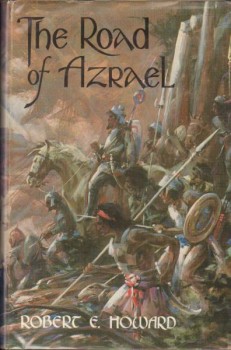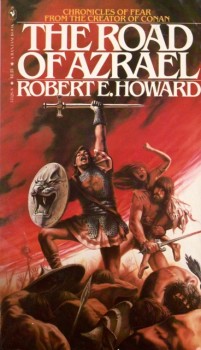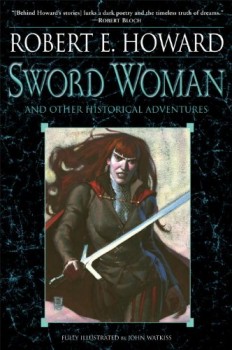The Road of Azrael by Robert E. Howard
 I can remember when my dad brought home The Road of Azrael (1979) and Sowers of the Thunder (1980), collections of Robert E. Howard’s historical adventure tales. My reading tastes were so exclusively fantasy and science fiction then, I couldn’t imagine wasting any time on boring, mundane stories. No wizards, no demons? What the heck was anybody thinking?
I can remember when my dad brought home The Road of Azrael (1979) and Sowers of the Thunder (1980), collections of Robert E. Howard’s historical adventure tales. My reading tastes were so exclusively fantasy and science fiction then, I couldn’t imagine wasting any time on boring, mundane stories. No wizards, no demons? What the heck was anybody thinking?
I grew out of that attitude a few years later and read both volumes. I remember liking them, but if you asked me for details on either one, I couldn’t have told you a thing. I read them once and never again. In fact, until recently I hadn’t read any other historical adventure even though, theoretically at least, I was a fan. I mean, it’s one of the primary root sources of swords & sorcery. At a very basic level, Robert E. Howard took the historical adventures of writers like Harold Lamb and Talbot Mundy and added magic and monsters.
It wasn’t until I started blogging about swords & sorcery and started getting all sorts of recommendations for the stuff that I looked into the genre again. With my review of Henry Treece’s The Great Captains four years ago, I started including some novels in my writing for Black Gate. I’ve been including a taste every month or so (most recently Purity of Blood by Arturo Pérez-Reverte), and it’s gone over well.
One of the pledges I made to myself at the start of my Black Gate tenure four years ago, was to avoid the big names of swords & sorcery. No one, I felt, needed another article about Michael Moorcock, or Fritz Leiber, or especially Robert E. Howard. Considering I wrote about Karl Edward Wagner’s Night Winds for my very first full review, THAT promise didn’t last very long, but I have tried to keep my focus on lesser-known or forgotten authors in my reviews of older works. Since then, I’ve reviewed a Moorcock book, a new one by Charles Saunders, and several more Wagner books, but until now I’ve steered clear of REH (especially because Bob Byrne has done a terrific job writing about him here at BG in his ongoing Discovering Robert E. Howard columns). It’s too hard to completely avoid the foundational figures of swords & sorcery when writing as often as I do, but I try to keep it to a minimum.
All this is a complicated way to say I’m reviewing The Road of Azrael by Robert E. Howard, and feel fully justified in doing so. It collects five historical tales of varying quality.
The paperback edition I read has execrable cover art, which did nothing to add appeal for me. Fortunately, the first thing in the book is a laudatory introduction by Gordon Dickson, no slouch of a storyteller himself, praising REH’s storytelling talents. Not that I need reminding of just how good Howard could be, but it’s always nice to see him get the praise he deserves. Unfortunately, I did not like the opening story, “Hawks Over Egypt.”
 It kicks off with two men, each convinced the other is following him through the night-darkened streets of Cairo. Ready to draw swords on each other, they realize they’ve been mistaken as they come together to fight a trio of Sudanese soldiers appearing out of the shadows, intent on killing them both. Following an expertly-presented and -choreographed fight, we learn the two men are Afdhal — a Memluk recently arrived in Egypt — and Diego de Guzman — a Spaniard, also only just arrived. The latter man has come in search of vengeance against Zahir el Ghazi, a man who betrayed him in battle to calamitous effect.
It kicks off with two men, each convinced the other is following him through the night-darkened streets of Cairo. Ready to draw swords on each other, they realize they’ve been mistaken as they come together to fight a trio of Sudanese soldiers appearing out of the shadows, intent on killing them both. Following an expertly-presented and -choreographed fight, we learn the two men are Afdhal — a Memluk recently arrived in Egypt — and Diego de Guzman — a Spaniard, also only just arrived. The latter man has come in search of vengeance against Zahir el Ghazi, a man who betrayed him in battle to calamitous effect.
As the story proceeds, it follows de Guzman’s hunt for el Ghazi. Simultaneously, it tells of the fall, rise, and fall of Zaida, a Venetian woman who manages to attach herself to the mad caliph, Al Hakim. His own activities take up another portion of “Hawks Over Egypt.” For such a short story — forty pages — Howard jammed in far too many things deserving far more attention. As a result, none of the characters come to life enough for the reader to really care about them. Which is a terrible shame, because there’s some great stuff.
Howard’s depiction of the street battles that ravage Cairo while the assorted characters each follow their prospective goals is powerful and brutal:
In the great square in el Mansuriya, the tossing torches blazed on a maelstrom of straining, plunging figures, screaming horses, and lashing blades. Men brown, black, and white fought hand-to-hand, Berber, Sudani, Egyptian, gasping, cursing, slaying, and dying.
For a thousand years Egypt had slept under the heel of foreign masters; now she awoke, and crimson was the awakening.
Like brainless madmen, the Cairenes grappled the black slayers, dragging them bodily from their saddles, slashing the girths of the frenzied horses. Rusty pikes clanged against lances. Fire burst out in a hundred places, mounting into the skies until the herdsmen on Mukattam awoke and gaped in wonder. From all the suburbs poured wild and frantic figures, a roaring torrent with a thousand branches all converging on the great square. Hundreds of still shapes, in mail or striped kaftans, lay under the trampling hoofs, the stamping feet, and over them the living screamed and hacked.
As in Tim Willocks’ monumental The Twelve Children of Paris, this urban terror should serve as a harrowing stage for characters’ exploits. But here it never feels connected to the characters. It never becomes more than a canvas backdrop.
Howard’s untoward depiction of race is something that’s been raised many times, and “Hawks Over Egypt” contains sad examples. They are offensive and they are lazy. It’s not the characters speaking, but Howard, and he falls back on some of the hoariest and tiresome racist clichés. If he wanted to describe a black character as vicious and terrible, there are more original ways than likening him to a ape.
The second story, “The Track of Bohemond,” is only a fragment. Again, there’s a great setup, suspense, and bold action, as the knight, Roger de Bracy, races to stop the ambush and assassination of Bohemond, one of the First Crusade’s greatest commanders. It’s by no means a bad story; it jumps from scene to scene with increasing tension and building ferocity, but in the end it’s to no real purpose. As an unfinished fragment, it exists as a tantalizing chapter in what might have been a great story.
“Gates of Empire” is the highlight of the book, and it gave me the most pure enjoyment reading Howard since I first read “Red Nails” as a lad. Unlike any other story of his, it features an unredeemable scoundrel, the Falstaffian Giles Hobson, a fat, tale-telling sot living in the castle of Godfrey de Courtenay. When, for a lark, he engineers a fight between Godfrey and his brother-in-law, Sir Guiscard, it almost leads to serious bloodshed, and Hobson must take flight. That flight carries him across France, the Mediterranean, and to distant Egypt. He is plagued by calamity — and regular appearances of Sir Guiscard, hot for his blood– each step of the way.
This story had me laughing aloud several times. There’s a strand of nobility in even the least of Howard’s other protagonists, but not in Giles Hobson. It could be argued he exhibits some nobility in the end, but prior to that he never once regrets his misdeeds, only their consequences. There’s a certain charm to such an unrepentant rogue.
Here he is, re-encountering Sir Guiscard for the first time, miles from home, completely unexpectedly:
From the survivors aboard the San Stefano rose a shout of joy. The galleys were racing southward. The nearest dromond swung ponderously alongside, and brown faces framed in steel looked over the rail.
“Ahoy, there!” rang a stern-voiced command. “You are sinking; stand by to come aboard.”
Giles Hobson started violently at that voice. He gaped up at the battle-castle towering above the San Stefano. A helmeted head bent over the bulwark, a pair of cold grey eyes met his. He saw a great beak of a nose, a scar seaming the face from the ear down the rim of the jaw.
Recognition was mutual. A year had not dulled Sir Guiscard de Chastillon’s resentment.
“So!” The yell rang bloodthirstily in Giles Hobson’s ears.
“At last I have found you, rogue-”
Giles wheeled, kicked off his boots, ran to the edge of the roof. He left it in a long dive, shot into the blue water with a tremendous splash. His head bobbed to the surface, and he struck out for the distant cliffs in long pawing strokes.
A mutter of surprise rose from the dromond, but Sir Guiscard smiled sourly.
“A bow, varlet,” he commanded.
 The story is also a terrific yarn. There’s adventure on the high seas, deadly court intrigue, and finally, a massed combat in the desert sands, on which the fates of empires hang. While Hobson is no typical Howard protagonist, the story is an exemplar of his creator’s tremendous talents.
The story is also a terrific yarn. There’s adventure on the high seas, deadly court intrigue, and finally, a massed combat in the desert sands, on which the fates of empires hang. While Hobson is no typical Howard protagonist, the story is an exemplar of his creator’s tremendous talents.
In “The Road of Azrael,” the Turkish warrior, Kosru Malik, recounts his adventure with the Frankish knight, Sir Eric de Cogan. The knight has ventured into the dangerous lands beyond the Crusader states in search of his kidnapped beloved, Ettaire. She’s been carried off by a Persian lord, given by her uncle in exchange for help in securing control of the Crusader-held city of Edessa.
Until the improbable — dare I say, utterly unbelievable — appearance of a band of horn-helmeted Viking warriors in the wilderness of the Holy Land, the story is an amazing, swirling, coincidences-be-damned bolt of lightning. The action doesn’t stop with the Vikings’ arrival, only hits a solid wall of nonsense. Without giving away a big reveal, I will only say their appearance, in someone else’s hands — say Tim Powers’, could have been its own ripping yarn. Here, it crushed the moment. Even when the action resumes, which it does with gusto, I had lingering disappointment with what should have been a truly classic adventure story.
The final story, “The Way of the Swords,” leaps half a millennium ahead, to the Black Sea and Armenia in the 16th century. Various factions and underwhelmingly fleshed-out characters battle and kill their way across valleys and hills. Before the story ends with another ridiculous, or at least poorly-hinted-at, coincidence, bodies are piled up in stacks. The Turkoman destruction of the Armenian village is one of the most gruesome things I’ve read lately. While not as graphic, the sequence is equal in its depiction of callous viciousness to anything written today. Overall, I found the story fragmented and, again, filled with many story strands and characters with too little development to form a coherent, satisfying story.
My obvious complaints aside, I still liked the book. Howard was a master of scene-setting and worldbuilding. The opening of each of these stories is bold, grabbing you by the lapels and dragging you into what will presumably be a maelstrom of clashing swords and chopped-off limbs. These scenes are marvelously choreographed, and no longer or more detailed than they need to be. I can’t vouch for the accuracy of Howard’s depictions of swordplay, but it never feels less than real. To his worldbuilding, I don’t mean that of the gazetteer- and map-filled sort endemic to modern fantasy, but that where, in only a few sentences or paragraphs, the reader is transported to the shadowed alleys of Cairo, or a dank castle basement in France, or the wilds of the Levant. There is a brilliant economy to his writing, and his successes remain readable eighty-plus years after they were written.
Now, here’s the thing. I own this book, but there’s no reason for you to. All the stories (“The Way of the Swords” is titled “The Road of the Eagles”) are collected in Del Rey’s compendious collection of Howard’s historical tales, Sword Woman (2011). That book also has a valuable essay by Howard Andrew Jones commenting on each of the stories and REH’s evolution as an author. Like all the other Del Rey REH collections, you should own this one already.
Fletcher Vredenburgh reviews here at Black Gate most Tuesday mornings and at his own site, Stuff I Like when his muse hits him. Right now, he’s writing about nothing in particular, but he might be writing about swords & sorcery again any day now.
I finally read Sword Woman earlier this year and the man certainly could write!
And there’s no reason to own the paperback of Road to Azrael, but a case could possibly made for the Donald Grant hardcover, just for the art (Krenkel, wasn’t it?).
“Unlike any other story of his, it features an unredeemable scoundrel, the Falstaffian Giles Hobson…”
Falstaff was REH’s favorite Shakespearean character.
This yarn was written before “Queen of the Black Coast”. Compare Giles and the Genovese battling the Barbary pirates with Conan and the Argosseans versus the Black Corsairs. Lots of similarities.
I would only be seen in public, hell even home, with the Krenkel edition.
I take the opposite tack to Fletcher with ‘Gates to Empire.’ One of my least favorite stories in the book and I was rooting against Hobson, the protagonist. He was a self-absorbed scoundrel who deserved his comeuppance from the first scene, which didn’t lead to enjoying the story much, since he kept escaping retribution until the end.
Scott Oden recently wrote me that “Hobson is the least Howardian character he ever wrote.”
That’s certainly true!
BTW – speaking of Falstaff, John Hillerman (Higgins on Magnum PI and Doctor Watson opposite Edward Woodward’ Holmes in ‘Hands of A Murderer’) recently passed. He would have been a good stage Falstaff.
Howard’s historical fiction is possibly some of his finest work, even better than his Conan tales in my opinion. I have a battered paperback copy of Sowers of the Thunder that I loan out to people I know if they want to try Howard’s work; it usually makes an impression. Also, anyone who reads pulp fiction written in the 30’s had better be prepared for some racist opinions and descriptions; one cannot judge these works fairly from a 21st century perspective. If you can handle some racist moments, you will also encounter some of the best pulp adventure writing ever.